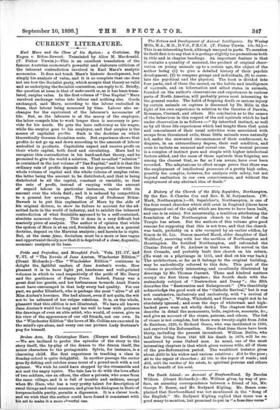CURRENT LITERATURE.
Earl Marx and the Close of his System : a Criticism. By Eugen v. BOhm-Bawerk. Translated by Alice M. Macdonald. (T. Fisher Unwin.)—This is an excellent translation of the famous Austrian economist's powerful and elaborate criticism of the inherent contradiction involved in Karl Marx's analytic economics. It does not touch Marx's historic development, but simply his analysis of value, and it is so complete that one does not see how the Socialist party, which accepts that theory as valid and as underlying the Socialist contention, can reply to it. Briefly, the question at issue is that of mehr-werth or, as it has been trans- lated, surplus value. In the first volume of "Das Kapital "Marx resolved exchange value into labour and nothing else. Goods exchanged, said Marx, according to the labour embodied in them, that labour being measured by time. Labour also ex- changes for the equivalent of the labourer's necessaries of life. But, as the labourer is at the mercy of the employer, the latter compels him to work longer than is necessary to pro- vide for his needs. He gets the bare sufficiency as his wages, while the surplus goes to his employer, and that surplus is the source of capitalist profits. Such is the doctrine on which theoretically German Socialism rests. But experience shows that profits do not go up and down according to the amount of labour embodied in products. Capitalists expect and receive profit on their whole capital, both fixed and circulating. Marx had to recognise this contradiction in his hard-and-fast theory, and he promised to give the world a solution. That so-called "solution" is contained in the last volume of "Das Kapital," and it is that the ordinary rate of profits depends on the proportion between the whole volume of capital and the whole volume of surplus value, the latter being the amount to be distributed, and that is being distributed to all the capital, constant or variable, so that the rate of profit, instead of varying with the amount of unpaid labour in particular instances, varies with its amount over the whole field ; and it is reduced by competition to a general low average. The object of Professor Bohm- Bawerk is to put this explanation of Marx by the side of his original dictum, to show its failure to account for the ad- mitted facts in the world of industry, and to exhibit the inherent contradiction of what Socialite essumed to be a self-contained, absolute economic theory. This is done in a very difficult but masterly piece-of analysis. The author is of opinion that while the system of Marx is at an end, Socialism does not, as a general doctrine, depend on the Marxian analysis ; and herein he is right. But, at the Same „time, Socialism must be a more or less vague and opportunist theorY,now that it is deprived of a clear, dogmatic, economic analysis at its base.


































 Previous page
Previous page